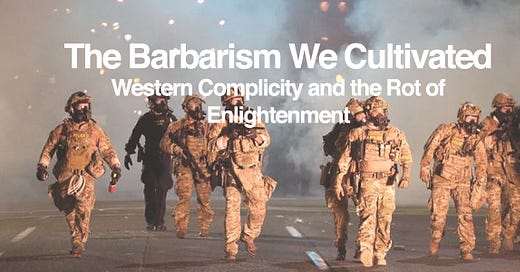Morning Comrades.
“They say: ‘How strange! But never mind, it’s Nazism, it will pass!’” wrote Aimé Césaire in his Discourse on Colonialism, condemning the astonishment of Europeans who, having long ignored or justified violence inflicted upon the colonized world, were suddenly appalled to find similar violence deployed against themselves. His critique is not just about hypocrisy; it is about historical inevitability. Césaire describes what Hannah Arendt later expanded upon, for us to arrive at what we now call the “boomerang effect” of imperialism, the idea that the technologies, logics, and mentalities of colonial domination would return to engulf the imperial core itself.[1] That moment has come again, not as a singular eruption but as a long, grinding catastrophe.
Today, the imperial boomerang returns in the form of militarised police forces, hyper-surveillance, the erosion of civil liberties, and the violent suppression of dissent across Western democracies. Yet what is especially critical now, what makes this iteration distinct in its reach and brutality is that the violence is no longer reserved only for racialized or colonized populations. Or rather that using the idea of this being critical, it is now available for all to see. The capitalist class war, once buffered by the ideological and material concessions of the welfare state and white privilege, now includes the wholesale targeting of the working class across all racial and national boundaries. The white working class, historically mobilised as the buffer zone between the capitalist elite and the racialized underclass is now being stripped of its illusions of immunity. The very institutions they believed served them, parliament, police, press are weaponized against them when they organize, strike, or dissent. Their former complicity has earned them no protection, only delay.
This reality forces a bitter reckoning, especially among sectors of the white proletariat who long saw themselves as insulated from state repression. The awakening is often slow, confused, and haunted by regret. Here, the poem of Martin Niemöller gains renewed significance. “First they came for the communists…” is no longer a warning from the past but a reflection of the present. Niemöller’s own journey, from Nazi supporter to imprisoned dissident mirrors the trajectory of those who once upheld the system only to find themselves abandoned or punished by it. The recognition of complicity, as Niemöller knew, often arrives too late.
And yet the poem has often been read in sentimental or depoliticized terms, stripped of its material context. What it really underscores is the cost of political passivity, of moral compartmentalization, of believing that the machinery of repression can be contained. The current moment proves otherwise. From the United Kingdom’s criminalization of climate and anti-genocide activism, to Germany’s bans on pro-Palestinian expression, to the United States’ deployment of militarized police against striking workers and land defenders, the logic of state violence no longer distinguishes between “acceptable” and “unacceptable” targets, it engulfs all who pose even the smallest threat to capitalist order.
This is why Césaire’s words are more than historical reflection; they are prophecy. Barbarism is not new. It was simply normalized through distance, geographical, racial, and class-based. And now that the walls of separation have collapsed, Western societies once again profess “surprise,” as if history had not warned them, as if they had not themselves built the machinery of their own repression. What they once watched dispassionately from afar, in the colonies, in the refugee camps, in the police killings of Black people, they now experience as shock. But it is not sudden. It is a slow culmination. It oozes, seeps, and trickles from every crack, until the whole edifice is flooded.
Today’s dispatch applies Césaire’s radical clarity to the contemporary moment, using the confessional legacy of Niemöller, the political dissection of Arendt, and the philosophical indictment of Enlightenment by Horkheimer and Adorno. Together, they expose a single truth: the violence now visiting the Western working class is not a rupture with liberal modernity, but its logical continuation. Only through the abandonment of delusion, the rejection of exceptionalism, and the recovery of solidarity can the entire working class hope to resist the tide now reaching every doorstep.
Keep reading with a 7-day free trial
Subscribe to Black Lodges to keep reading this post and get 7 days of free access to the full post archives.




